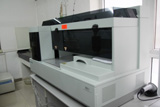Knowing about your condition well
No matter what kind of kidney disease you are suffering from, you can find the useful information about your condition, like its natural and efficient treatment and how to live well with it.
CKD Basics
Chronic Kidney Disease(CKD) refers to the chronic renal damage or the severe decline of GFR in more than 3 months.In early stage,the patients may not feel the obvious uncomfortable,which is the reason why many patients are diagnosed with renal failure when they are feel not well.
Diagnosis
The renal damage or the renal dysfunction is mainly characterized by 2 conditions.One is the abnormal blood,urine or the imageological examination.The other is the reducing GFR that is less than 60ml/(min•1.73m2) for more three months.
The Stage of CKD
According to the GFR,CKD can be divided into 5 stages.
stage |
description |
GFR ml/min/1.73m2 |
Ⅰ |
slight renal damage with the normal or increased GFR |
≥90 |
Ⅱ |
renal damage with the slight decreased GFR |
60~89 |
Ⅲ |
moderate decline of GFR |
30~59 |
Ⅳ |
severe reduced GFR |
15~29 |
Ⅴ |
ESRD |
<15 |
PS.GFR means the the glomerular filtration rate that is a index of renal function.
Test
Some routine tests are common to patients,like Blood Test,Creatinine,etc.Besides,our hospital provides other special tests for patients:
--Lymphocyte Subsets
--Urine Protein Electrophoresis
--Autoantibody Tests
--Toxins in Blood Serum
--Kidney Damage Tests
--Emergency Tests
--Diagnosis of Hematuria Position
--Lab Tests for Complement
Cause
The mainly cause of CKD are high blood pressure and diabetes.There are other reasons also may lead to or worsen the damage to kidneys,such as infection,poor external environment and overwork,etc.The different disease condition depends on the different patients'habitus.If you want to know more about your disease condition,you can contact live doctor.
Prognosis
Prognosis of CKD is various,due to the chronicity and complexity of thus disease.Besides,some severe complications may worsen the disease,such as high blood pressure,CVD,and so on.It is necessary to take the timely and effective treatments to control the disease condition and relieve ethe symptoms as far as possible.Besides the drug therapy,die therapy are also important to patients.
CKD Basics | CKD Symptoms | CKD Diet | CKD Treatment | CKD Healthy Living
Chronic Nephritis Basics
Chronic nephritis is a progressive kidney disorder in which kidneys become inflamed. It can be idiopathic or secondary to other conditions. However, the most common cause of chronic nephritis is autoimmune disorder.
Causes
Streptococcus bacteria infection is a common of nephritis, especially in children. Once the bacteria affect your body, it will lead to an immune reaction which damage the blood filters in kidneys.
Systemic disorder also can involve kidneys like systemic lupus erythematosus (SLE), purpura, vasculitis etc. In addition, if you use anti-inflammation medications like pain killer, aspirin etc, it may also impair kidney tissues and cells.
Prognosis
The prognosis of chronic nephritis varies from individual to individual as it is affected by many factors. Factors which may affect the prognosis include:
Pathological types
1. The pathological types including membranous proliferative nephritis, FSGS, mesangial proliferative nephritis, mesangial proliferative nephritis. The prognosis of mesangial proliferative nephritis is generally better than other pathlogical types. 2. The more number of fibrous crescents, sclerosed glomeruli, interstinal fibrosis and renal tubular atrophy, the prognosis is worse. 3. Patients with serious renal vascular diseases have a bad prognosis.
Complications
The complications affect a lot in deciding the prognosis of chronic nephritis. If the patients have heave protein in urine and uncontrolled high blood pressure, they are prone to having a worse prognosis.
Treatment
Treatment plays the most part in affecting the prognosis of chronic nephritis. If the immune dysfunction can be corrected, the renal function will stop declining. If the renal function can be improved, the patients will be able to return to a normal life. Immunotherapy and Micro-Chinese Medicine Osmotherapy are recommended and effective treatments for chronic nephritis. These two treatments can treat chronic nephritis from its underlying causes.
Prevention
To avoid developing chronic nephritis, the best preventive measure is to control the triggering factors. If you have the following conditions, you are more likely to develop nephritis.
1.Since nephritis can be caused by other diseases such as lupus, purpura, hepatitis etc, aggressive control of the primary diseases can prevent them from affecting kidneys.
2.You should use medicines and drugs in a rational way. Avoid abuse of drugs completely.
3.Streptococcus bacteria infection is one of the most causes of nephritis. Once you have this problem, you should seek for an effective treatment as early as possible.
Chronic Nephritis Basics | Chronic Nephritis Symptoms | Chronic Nephritis Diet
Chronic Nephritis Treatment | Chronic Nephritis Healthy Living
Diabetic Nephropathy
Diabetic Nephropathy,caused by diabetes,is one of the most common and harmful complications of diabetes.It has become the second cause of ESRD.In addition,the complex metabolic disorders makes the treatments on DN be more difficult than other renal disease.
What is DN?
DN is mainly caused by the long-term diabetes more than 10-15 years,that will lead to the damage on glomerulus.What's worse,it may bring about ESRD after 5-20 years.
What causes DN?
The causes and pathogenesis are not clear at present.Recent years' research shows that DN is mainly caused by 3 factors:high sugar,high blood pressure and the certain genetic factor.
--high sugar may causes the damage on the whole body blood capillary by changing the renal hemodynamics or the disorganize the metabolism.
--high blood pressure
High blood pressure may bring some severe complications that can not be controlled effectively,which makes the prognosis for patients with DN be worse.
--genetic factor
The morbidity in male is higher than female.In the same environment,some family are easy to suffer from the DN,etc.
Diagnosis
The microalbumin is the sign of DN.Besides,the patients diagnosed with diabetes with the damaged kidneys or the high sugar may also be easy to suffer from the DN.
Prognosis
Owing to the chronicity of DN,when urine protein appears,the course of history is often more than 10 years.Thus the majority of prognosis is not well.According to the study, in 6 years,about 25% patients'condition worsen into renal failure stage;while 50% and 75% patients suffer from ESRD in 10 years and 15 years separately.The average time is ten years from the appearance of proteinuria to patients died of uremia,that is ESRD.
But as the experts say,if take the proper treatment,patients can live longer than excepting.What's more,the healthy diet and the optimistic mindset also play an important role in controlling the disease and prolonging the life-pan of patients.
Diabetic Nephropathy Basics | Diabetic Nephropathy Symptoms | Diabetic Nephropathy Diet
Diabetic Nephropathy Treatment | Diabetic Nephropathy Healthy Living
Hypertensive Nephropathy
HN(Hypertensive Nephropathy) is a secondary disease that caused by high blood pressure.
What is HN?
HN is a kind of benign or malignant arteriolar nephrosclerosis caused by primary hypertension,accompanying with hypertensive kidney disease accordingly.The disease often appears in the age of 40-60 years or older,with the high blood pressure history being 5-10 years or more.What's more,the morbidity in male is higher than in female.
Why high blood pressure causes HN?
Kidneys can be used to filtrate the toxin and prevent the leakage of protein,hemocyte. Firstly,the high blood pressure will increase the blood pressure in blood vesselm,causing the leakage of protein.The leakage of protein will damage the renal filtration system and lead to the vicious circle.
Secondary,the long-term high blood pressure causes the decline of renal blood flow,which leads to renal hypoxia-ischemia and damages the kidneys.
Thirdly,high blood pressure makes the adherence on vascular wall be easier than before,making the kidneys are infected easily.
Besides,the hyperfiltration and hypertransfusion of kidneys increase the burden and damage the kidneys.
The long-term damage on kidneys will be difficult to reverse and the compensatory renal increase will appears.What's worse,renal failure may occurs in advance.
Diagnosis
According to the causes,history,clinical manifestation and the laboratory tests of patients,make a definite diagnosis of HN.
Prognosis
Generally speaking,the prognosis of hypertensive nephropathy(HN) is not well.The long-term and severe high blood pressure causes the spasm and sclerosis of renal arterioles,accelerating the Glomerular capillary sclerosis and the damage on nephron.The deterioration of renal function is more obvious.What's worse,the high blood pressure will lead to serious complications,which may increase the death rate of HN.
Hypertensive Nephropathy Basics | Hypertensive Nephropathy Symptoms | Hypertensive Nephropathy Diet | Hypertensive Nephropathy Treatment | Hypertensive Nephropathy Healthy Living
IgA Nephropathy
IgA nephropathy is a kind of primary glomerular diseases caused by the autoimmune defects.
What's IgA nephropathy?
IgA nephropathy,called Berger's disease,is characterized by the deposition of immunoglobulin in GMA (glomerular mesangial area).
What causes IgA nephropathy?
IgA nephropathy is mainly caused by autoimmune disorders which means the IgA immune globulin goes wrong.The diseased IgA immune globulin will combine with autoantibody to form immune complex that may deposited in the GMA.In addition that the GMA has some affinity with these immune complex.The deposition of immune complex will secrete inflammatory factors,as the disease worsen,the damage is related to kidneys.What's worse,the damaged kidneys may result in renal failure.
Diagnosis
It is necessary to take the renal biopsy to diagnose the pathology.There must be immunofluorescence or immunohistochemical results to support this conclusion.
auxiliary examination
1.Immunologic test
About 50% patients have high level of serum IgA.37-75% patients era diagnosed with the specific CIC(circulating immune complex) that contains IgA.
2.Proteinuria
The examination of proteinuria is important to judge the disease condition and estimate the prognosis.The mild disease focal mesangial proliferation is the main symptoms when proteinuria< 1g/24h.Diffuse mesangial proliferation with crescent or glomerular sclerosis occurs in moderate or severe proteinuria.
3.Renal function
When serum creatinine is higher than 1.5mg/dl(132.6umol/L),the disease is progressing.Patients condition is worsen into stage 3 or worse with the GFR<20ml/min.
4.Hematuresis
That RBC in urine has various shapes show that the disease roots in glomerular.
Prognosis
There are several factors that influences the prognosis of IgA.
1.Gerontal patient and the patients with older age will influence the prognosis and may cause the bad prognosis.
2.Patients who are with continuous hematuresis and proteinuria will have the poor prognosis.
3.Renal failure has appeared in patients,which signifies the poor prognosis.
4.High blood pressure will increase the risk of complications and worsen the disease.
IgA Nephropathy Basics | IgA Nephropathy Symptoms | IgA Nephropathy Diet | IgA Nephropathy Treatment | IgA Nephropathy Healthy Living
Kidney Cyst Basics
Kidney Cyst refers to the various cystic mass that appears in both kidneys,sometimes just in one.
What is Kidney Cyst?
Kidney Cyst is the name for the cystic mass that are various and do not communicate with outside.In addition, they will become bigger and bigger with the time going on.What's worse,these cysts may rupture in body,which will cause the damage on kidneys.Finally,as the patients condition develop,kidney disease may deteriorate into ESRD.
Moreover,common Kidneys Cyst can be divided into APKD(adult polycystic kidney),Simple renal cyst and ACKD(acquired cystic kidney disease ).
What causes Kidney Cyst?
There is no specific reason to explain the Kidney Cyst.But experts have discovered that it may be relative to the following factors:
1.Congenital dysplasia:For Cystic nephritis,it may cause many diseases,such as medullary sponge kidney,dysplastic polycystic kidney,and so on.
2.Various infections:The infection may makes the abnormal changes in body,which will provide a good condition to cysts and increase the damage on kidneys.3.Toxin:It is one of the most important reasons that cause the gene mutation and congenital dysplasia,etc.
Diagnosis
There is no symptoms in early stage.It often be examined in the medical ultrasound or Competed tomography that can check out the cysts in kidneys.
Complications
With the disease process,the damage on kidney is worse and worse,the renal function is reduced badly.Then the serious complications may occur and it may also cause the pain of waist and abdomen,high blood pressure and proteinuria,etc.
Prognosis
Prognosis is various according to the different patients.With the severe complications or the dialysis,the prognosis are bad than other patients:on the other hand,if the patients is just diagnosed with Kidneys Cysts or the renal cant support.So the treatments on Kidney Cysts are kay to patients.
Kidney Cyst Basics | Kidney Cyst Symptoms | Kidney Cyst Diet | Kidney Cyst Treatment | Kidney Cyst Healthy Living
Kidney Failure Basics
Kidney failure,called renal failure,refers to a pathological state that is caused by various chronic kidney disease.The renal function will be reduced even failure.
The classification of renal failure
Renal failure usually include 2 types:acute renal failure and chronic renal failure.The former progresses quickly that is often caused by the short supply of the blood flow to kidneys,such as scratch and burn.Furthermore,the damaged renal function or the toxin may also cause the acute renal failure.On the other hand,with the time and disease development,the long-term lesions may lead to the decline of renal function gradually,and cause renal failure.
Causes
Kidneys are vital organs of the body.Generally speaking,there are 3 factors that cause renal failure.
Medicine
Some patients with high blood pressure or diabetes is easier to suffer from chronic kidney failure because of the long-term intake of nephrotoxic drugs.
Traumatic shock
Such as burn,excessive sweating and shock may cause the acute renal failure.Besides,heart attack will damage the kidneys also,and so on.
--Some disease may induce renal failure
Some complications,like high blood pressure or high blood sugar,may increase the renal burden and worsen the renal disease into renal failure.
Diagnosis
For kidney failure,some routine diagnostic methods should be taken to check the renal disease,such as blood routine examination,routine urianlysis,kidney function test,and so on.
Prognosis
There are several factors that influence the prognosis of renal failure.
1.Primary renal disease is closely related to the prognosis.
Various infections are one of the commonest influencing factors,such as respiratory and urinary tract infection.
2.The use of nephrotoxic drugs may also affect the prognosis of patients.
3.High blood pressure will increase the risk of serious complications that influence the prognosis of renal failure.
4.Heart failure that is caused by some reasons.
On the whole,there are many factors that affect the prognosis of renal failure,so it is important to pay attention to patients' daily life.
If you have other question about your disease,talk to live doctor and you can the free and professional guidance.
Kidney Failure Basics | Kidney Failure Symptoms | Kidney Failure Diet | Kidney Failure Treatment | Kidney Failure Healthy Living
Lupus Nephritis Basics
Lupus Nephritis,a secondary renal disease,is caused by SLE(Systemic Lupus Erythematosus) that is a type of autoimmune disease.
What's LN?
Just as its name implies,LN means that the SLE has already damaged the patients'kidneys gradually.The patients'kidneys is damaged worse and worse with the disease process.Finally,LN may deteriorated into ESRF.
What cause LN?
In fact,there is no certain conclusion about the causes of LN and SLE.According to recent researches,experts think that the main reason of LN,called Lupus Nephritis,is the deposition of immune complex on glomerulus capillary epithelial cells.Besides,heredity,habitus and the environment effect and worsen the disease process to some degree.
As the disease goes on,the lesions will damage the glomerulus and affect multisystem and multiple organs in body.The damaged barrier function can not work normally and effectively and it lead to renal damage is worse and worse.Thus the renal function causes lesion and be damaged badly.What's worse,part or complete function loss of kidneys,even ESRF.
Diagnosis
Diagnosis of LN mainly depends on the definite diagnosis of SLE.In addition,there are 2 points that need attention.
1.In some cases,renal biopsy are necessary to make the definite diagnosis.
2.Glomerular disease is the significant symbol of SLE.
In addition to the above 2 points,according to detailed patients' cases,laboratory examination and pathological examination can also make right diagnosis.
Prognosis
Due to the chronicity of LN,we can't make sure how long the patients can live certainly.
In generally,if you are diagnosed with LN,the survival rate of 5-10 years is 75%-85%.Moreover,with the disease process,leakage of massive proteinuria and hypertension may occur,which indicates that the disease is worsen.What's worse,some complications,like high blood pressure and high blood sugar,may increase the risk of exacerbation.about 20% patients with LN may evolve into uremia in 10 years,which is the main result of death.
Actually,different patients have different disease condition that lead to the various results of prognosis.An early and effectively treatment can make great difference to the life expectancy of LN patients.If you have problems about your disease,you can contact online doctor to get professional guidance freely.
Lupus Nephritis Basics | Lupus Nephritis Symptoms | Lupus Nephritis Diet | Lupus Nephritis Treatment | Lupus Nephritis Healthy Living
Nephrotic Syndrome Basics
NS(nephrotic syndrome),caused by various disease etiologies,is a group of clinical syndrome.is mainly showed as the increased permeability of glomerular basement membrane and the reduced GFR.
What's NS?
NS is not an independent disease but a group of glomerular disease.The typical symptoms mainly include massive proteinuria,hypoproteinemia,HLP(hyperlipidaemia) and highly edema.
What causes NS?
The causes of NS usually are divided into 3 types:primary,secondary and congenital.Rare patients are born with congenital NS and about 90% of patients are primary NS that belongs to primary glomerular disease.Secondary NS are mainly caused by other diseases,such as SLE,henoch-schonlein purpura nephritis,DN(Diabetic Nephropathy),etc.Besides,some inflammatory response and immunoreaction both may lead to NS.
Diagnosis
diagnostic criteria
1.urine protein is greater than 3.5g/.
2.plasma albumin is less than 30g/L
3.edema
4.HLP(hyperlipidaemia)
(Note:the first and the third are necessary to diagnose the disease.)
Three aspects of diagnose:
1.Make a definite diagnose of NS
2.Identify the cause of disease:Exclude secondary and genetic causes firstly,then identify the primary NS.It's better to take renal biopsy to make the pathological diagnosis
3.Diagnose the complications
Prognosis
The prognosis od NS are various,which mainly depends on the following factors:
1.pathological pattern
In general,The prognoses of Minimal Change Disease and mild mesangial proliferative glomerulonephritis are better.There is a tendency to spontaneous remission in some patients with Minimal Change Disease,so the alleviation rate is higher but it is easier to be relapsing.There are a higher remission rate in early stage.Although it is can not be relieved in later stage,the disease process is slow and the occurrence of Renal Failure is rather later.In addition,the level of proteinuria and the reaction of treatment effect the prognosis badly.
2.Clinical factors
Massive proteinuria,high blood pressure and high fat may also worsen the glomerular sclerosis,which may influence prognosis.
3.Severe complications
Some patients with recurrent infections and thromboembolism may have a less-than-ideal prognosis.
Nephrotic Syndrome Basics | Nephrotic Syndrome Symptoms | Nephrotic Syndrome Diet | Nephrotic Syndrome Treatment | Nephrotic Syndrome Healthy Living
PKD
PKD,called polycystic kidney disease,is a kind of hereditary disease caused by autosomal defect.
What is PKD?
PKD refers to many various cysts in renal parenchyma of both kidneys.Then the various cysts will be larger with the time going on and constrict the kidneys.What's worse,the bigger cysts will rupture and damage the kidneys,effecting the renal function.PKD has 2 types:ARPKD(Autosomal recessive polycystic kidney disease) and ADPKD(Autosomal Dominant Polycystic Kidney Disease).
What causes the polycystic kidney disease(PKD)?
The exact etiology of PKD is unclear. Although the symptoms appear in adulthood,the cysts often occur in foetal period.According to many studies,the abnormal cellular growth and changes as well as the intercellular substance that are caused by genetic defects are one of the most important causes of PKD.What's worse,as the time and disease progress,PKD will worsen into ESRF,which is the fourth reason.
Diagnosis
The diagnostic criteria of PKD can be divided into the main diagnostic evidence and auxiliary diagnostic evidence.
main diagnostic evidence
--numerous and unequal sized liquid cysts
--specific family history of ADPKD
--gene linkage analysis are positive
auxiliary diagnostic evidence
--polycystic liver
--renal insufficiency
--cysts on spleen or pancreas
--abnormal heart valve
--intracranial aneurysm
--ventral hernia
Some routine inspections,like CT,serum creatinine,urine routines,etc,play an very important role in diagnosed with PKD.
Prognosis
Owing to the heredity of PKD,there are no exact treatments to cure or stop the disease.So it is important to prevent the complications from appearing and stop the disease progressing.To controlling the high blood pressure,prevent the infections,and take a healthy diet are significant to delay the disease condition.
If you are diagnosed with PKD or you have other questions about your disease,you can contact with live doctor to get the professional guidance freely.
PKD Basics | PKD Symptoms | PKD Diet | PKD Treatment | PKD Healthy Living
FSGS
Focal Segmental Glomerulosclerosis (FSGS) refers to a disorder in which scar tissue develops on the kidneys' filters called glomeruli. Untreated, the disease usually leads to Kidney Failure where the only treatment options are dialysis or a kidney transplant.
Causes
Glomerulosclerosis is not caused by a single disease. It has several different causes. This scarring may occur due to an infection, or drug toxicity, or a disease that affects the entire body, such as Diabetes, HIV infection, sickle cell disease or lupus. At times, there may be a genetic component in some patients.
Diagnosis
A kidney biopsy can be down to make an accurate diagnosis of glomerulosclerosis. In a biopsy, the doctor will remove a very small amount of renal tissue. The tissue is examined for signs of scarring.
Diagnosing FSGS may require multiple biopsies, as the scarring does not occur throughout the kidney. The doctor have to look at samples from several different parts of the kidney until an affected area is found.
Other tests that may be ordered include GFR, kidney ultrasound, and genetic testing.
Prognosis
Untreated, most patients with FSGS will finally enter into complete kidney failure and require dialysis or a transplant to survive. Even with treatment, many patients will still eventually require dialysis (in around 2-20 years).
Kidney transplant in FSGS
In about 20-50% cases, the disease may return in the transplanted kidney. Risks that may include the recurrence of the disease may include:
- Age (< 15 years old);
- If the disease took less than 3 years from the diagnosis of the disease to reach kidney failure;
- Caucasian race;
- Loss of a previous transplant due to return of FSGS.
The recurrence of the disease in transplanted kidney occurs very soon after the operation. It can return within hours to days. Most cases will be within the first year after transplantation.
More than 50% of people with recurrence of the disease will lost their kidney within 5 years. Of all the patients with this disorder who get a transplant, around 15% will lose the kidney due to recurrent FSGS.
FSGS Basics | FSGS Symptoms | FSGS Diet | FSGS Treatment | FSGS Healthy Living
Membranous Nephropathy
Membranous Nephropathy (MN) refers to a disorder that damages the kidneys' filters called glomeruli due to immune complex deposits within the kidney. It is one of the most common causes of Nephrotic Syndrome in adults. Over time, this can result in kidney failure as well.
The disease affects patients of all ages but it is more frequently diagnosed in middle age (40-50 years old). Although it is more common among Caucasians, the disease occurs in all races.
Diagnosis
A kidney biopsy is done to make a diagnosis of Membranous Nephropathy and to distinguish it from other disorders that may also lead to protein (and blood) losses in the urine.
Blood tests can be done to look for evidence of infections and autoimmune disorders that may be related with this kidney disease. Other screening tests like a chest x-ray and mammogram (in women) may be suggested by the doctor.
Prognosis
About 40% of patients diagnosed with this disease experience a spontaneous remission within 5 years, even without treatment. On average, 20 years after diagnosis, 1/3 of patients will be in complete remission, and 1/3 will have developed into end-stage renal disease (ESRD) and need dialysis or a kidney transplant. Those individuals that initially present over 1g/day of protein in urine for more than 6 months tend to do worse. Their kidney function usually decreases regardless of treatment.
Kidney transplant in Membranous Nephropathy
There is a 10-30% chance that the disease will recur in the transplanted kidney. In general, the recurrence will occur in the first two years after transplant.
At present, there are no specific treatments for recurrence MN in the transplant. Up to 50% of patients with recurrence of the disease will lose their kidney. About 10-15% of all patients with the disease will eventually lose the kidney.
Membranous Nephropathy Basics | Membranous Nephropathy Symptoms | Membranous Nephropathy Diet | Membranous Nephropathy Treatment | Membranous Nephropathy Healthy Living
Purpura Nephritis
Purpura Nephritis,called Henoch-Schonlein purpura nephritis,is caused by HSP (Henoch-Schonlein Purpura) with necrotizing vasculitis as the main pathological changes of systemic diseases
What's Purpura Nephritis?
Purpura Nephritis refers to the damage on kidneys that is caused by HSP that belongings to systemic diseases with necrotizing vasculitis as the main pathological changes.Except some symptoms like skin purpura, stomachache or hemafecia,hematuria and proteinuria may occur.Whats' worse,the lesions may damaged the renal function badly.The damage on kidneys usually appears within days to weeks after skin purpura.
What causes the Purpura Nephritis?
The reasons of Purpura Nephritis care some allergic reaction cause by infections of germ,virus or parasite.Besides,some foods and drugs may cause the allergy,which is also likely to produce Purpura Nephritis.
1.Infections
Some patients with Purpura Nephritis are usually diagnosed with URI(upper respiratory infection) before.
2.Drugs
Drugs like antibiotics,sulfonamides and captopril,may cause allergy,leading to Purpura Nephritis.
3.Foods
Sea foods are usually to effect the disease,like shrimp and crab diver.
4.Others
Pollens of plant,ova,oil paint and so on.
Diagnosis
The diagnosis of Purpura Nephritis must meet the the following three conditions:
(1)There are some symptoms of skin purpura.
(2)Some clinical symptoms of damaged kidneys,like proteinuria,high blood pressure and hematuria,etc.
(3)Pathologic change tested by renal biopsy shows the deposition of IgA on mesangial area and mesangial proliferation.
Prognosis
The prognoses of Purpura Nephritis are very different owing to the level of disease condition.Patients with simple hematuria have a good prognosis.However,when various level proteinuria or NS and the progressive deterioration of renal function occur,the prognose are bad.
Purpura Nephritis Basics | Purpura Nephritis Symptoms | Purpura Nephritis Diet | Purpura Nephritis Treatment | Purpura Nephritis Healthy Living
ESRD
ESRD refers to the stage 5 of CKD.In this stage,the GFR< 15ml/(min.1.73m2),the renal function is damaged so badly that it have already can not work regularly and effectively.
In early stage,the ESRD has no obvious discomfort.While as the renal function reduces continuously,toxin,metabolite and waste accumulate ib body,which will cause the various complications.
Diagnosis
--renal function tests
Some treatment options,including BUN,Creatinine,urine protein and so on,are taken to diagnose the renal function.
--Urine Routine Test
It is used to detect the protein and red blood cell in urine. Detection of proteinuria can remind patients of the specific disease condition.
Test
--Renal function test
If the inflammation appears,the renal tubules function will decrease,the leakage of sodium and potassium will increase,thus metabolic acidosis may also occurs.
--Urine culture check
It refers to check the cultured normal urine that can be tested if there is bacteria accurately.
--routine urianlysis
It is the common test for patients with CKD,which can test the protein or erythrocyte in urine.
Prognosis
For ESRD patients,timely and effective diagnosis and treatments play an important role in prognosis of ESRD.
Moreover,a healthy diet also can do more to control the disease condition.
Besides,some severer complications may aggravate the disease condition even cause patients death. Such as high blood pressure,CVD(Cardiovascular Disease) and so on.
ESRD Basics | ESRD Symptoms | ESRD Diet | ESRD Treatment | ESRD Healthy Living





























